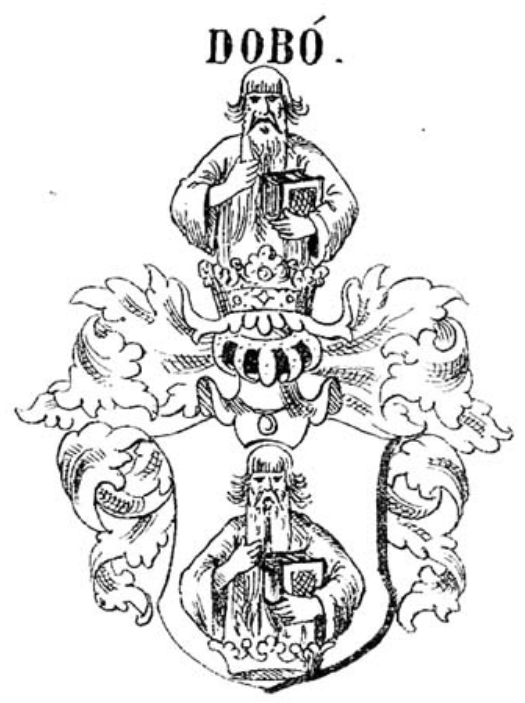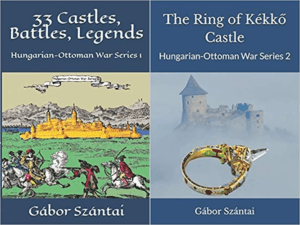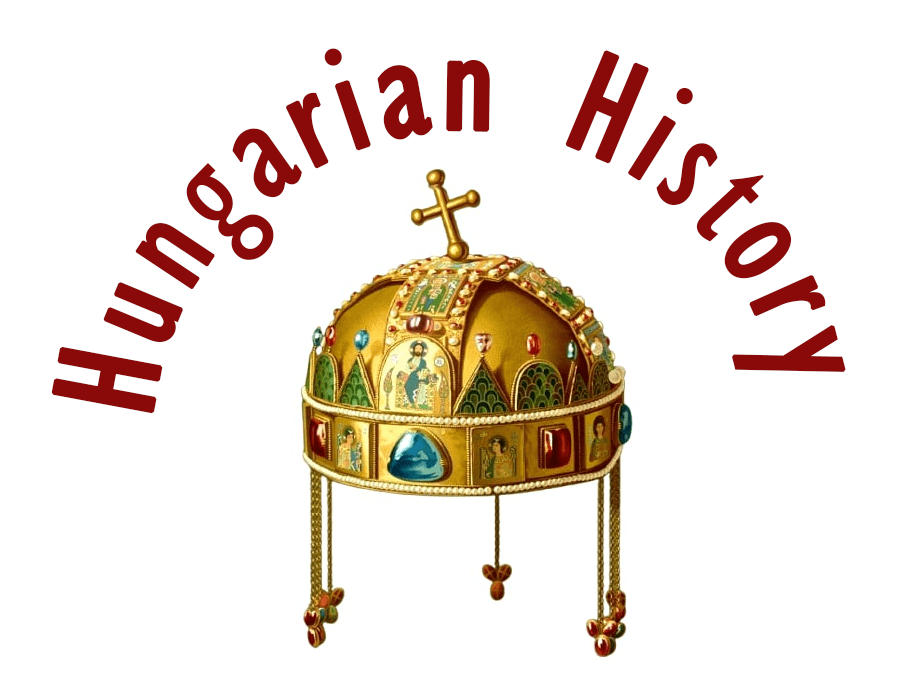
He was a Hungarian soldier best known as Eger’s castle captain in 1552. As a nobleman, a Catholic landowner from the Highlands of Hungary, he sided with King Ferdinand in the struggle between the two kings after the Battle of Mohács. The ancestors of the Dobó family appeared among the landowners of Abaúj county in the 13th century. Later, when they acquired Ruszka in Ung County, they added the name of the village to their noble name.

Dobó István’s father Domokos married Cékei Zsófia in 1498 and had four sons, Ferenc, László, István, Domokos, and two daughters, Anna and Katalin. István was born probably towards the end of 1502, but we do not know more about the date. He was 8 years old when his father was murdered in a land deal.

However, his mother kept a firm grip on the estates and enriched them, educated her children, taught István Latin, taught him to read and write, and gave him a thorough knowledge of economics and military training. The latter appears to have been learned as an apprentice at the court of a nearby lord.

After the Battle of Mohács in 1526, Dobó István sided with King Ferdinand and was committed to the Habsburgs for the rest of his life. He took part in the anti-Turkish battles with his brothers (László died early), and Domokos was also taken prisoner. From their castle in Szerednye, they tried to take control of the region, they were tyrannical, they ran riot and they lived from the wine trade. Dobó István was known in his time as a particularly stingy, greedy man.

In 1544, at the meeting of the counties of the Tisza region in Sajószentpéter, he received the right to tithe the bishopric of Eger. This was to be used to modernize the castle of Eger. But Dobó’s rival, the castellan of Perényi Péter, who was in the captivity of Ferdinand and held the castle of Eger, Varkocs Tamás, refused to let the royal troops into the castle. Although Dobó was appointed castellan of Eger Castle in April 1546, Varkocs Tamás refused to allow him to occupy his seat.

He finally received the keys to the castle on 20 July 1548. He did his best to strengthen Eger. He collected revenues with his iron hand, accumulated sufficient food, ammunition, and supplies, fortified the walls, built a new bastion on the city side (the Dobó’s Bastion), erected an earth and wood structure in front of the Dungeon Bastion (the Earth Bastion) and completed the separation of the inner and outer castle.

He built a network of observation posts around Eger (Szarvaskő, Cserépvár, etc.) He was sure that Eger would soon face a serious siege, so he kept spies not only in the Turkish fortresses in Hungary but even in Drinapolis. From them, he learned in time that one of the targets of the Sultan’s army in 1552 would be the castle of Eger.

When word came that the Turks were approaching in force, he sent letters to Ferdinand and his son, Maximilian, asking them to send help to Eger. He bought gunpowder, requested cannons from neighboring towns and landowners, and increased the number of soldiers. About 2,000 soldiers awaited the army of Ahmed and Ali Pasha. The siege of the castle finally began on 11 September 1552.

Dobó made his soldiers swear to hold out to the end. Throughout the five-week siege, he fought at the head of his soldiers, intervening personally when necessary. He relieved the stragglers with rested troops and sometimes personally handled the cannons, suggesting that he had also become skilled in the use of firearms. He entrusted the defense of the outer castle to his lieutenants, Bornemisza Gergely, Zolthay István and Pethő Gáspár.

He kept serious discipline among the soldiers, had the Turkish letters calling for surrender burned, and had Lieutenant Hegedüs István hanged. Even after the explosion of gunpowder on 4 October, he encouraged the guards to continue resisting, dug countermines for the Turks who wanted to undermine the castle, repaired the destroyed walls, and did everything to keep the morale of the defenders up.

Three large infantry attacks were repelled by the men of Eger, and in the end, even women were fighting on the walls. Dobó himself was wounded. On 18 October, the Turkish army went home without finishing their work. The news of the victory spread quickly, cheering up Hungary and the Christian world, which had grown weary of previous Turkish conquests.

However, Dobó and his fellow captain Mekcsey István resigned in November. King Ferdinand I appointed him Voivode of Transylvania on 18 May 1553 and raised him and his descendants to the rank of baron. However, the honor of this national dignity took a huge burden upon him. In Transylvania, the party sympathetic to King Szapolyai and his son was strong, and in the autumn of 1553, Dobó had to put down a conspiracy.

His heavy-handed rule to collect the royal revenues and his Catholic religion made him many enemies in the mostly Protestant province. In 1556, the Transylvanian Estates recalled Isabella, the widow of Szapolyai János and her son, János Zsigmond, and wanted to win Dobó to their side. He protested and was imprisoned in the castle of Szamosújvár. After 10 months of resistance, he was forced to surrender the fortress and was arrested and imprisoned in Szamosújvár for a year.

In November 1557 he escaped from there only with the help of his wife, descended the wall on a rope ladder, and fled to Szerednye. As one of King Ferdinand’s favored followers, he received many gifts, including the castles of Léva and Végles, and the rich farming towns of Gönc and Telkibánya. He later acquired further manors and also earned the title of baron for his beloved brother Domokos. He became the fifth richest lord in the Kingdom of Hungary.

In 1562, Ferdinand appointed him captain of the Mining District, a post he held firmly, collecting revenues and making many enemies, especially among the citizens of the mining towns. In 1564 he was deposed.

After King Ferdinand’s death, relations between Dobó and the new ruler, Maximilian, soured. Rumors spread that he, his brother-in-law Balassa János, and a third nobleman from the Highlands, Drugeth Gáspár of Homonna, wanted to convert to the allegiance of King János Zsigmond. The Habsburg King took the rumors seriously, as they would have meant the loss of significant territories in Northern Hungary.

Homonnai fled to Poland, but Dobó and Balassa were arrested by the emperor at the Diet of Pozsony on 12 October 1569, even though the emperor had granted them a letter of asylum. It is still unclear whether the lords were plotting, as Dobó was approaching his seventieth birthday, and had remained a Habsburg loyalist throughout his life, and no evidence has been found.

Balassa soon escaped from captivity, but old Dobó was unable to do so. As the relations between Transylvania and the Habsburgs began to improve (the Treaty of Speyer), Dobó could escape. However, this only took place after lengthy negotiations in 1572. The doors of his prison were opened on 17 April. The former hero of Eger, in poor health, retired to his estate, where he died around 10 June.

In 1550 he married Sára, daughter of Sulyok Balázs. He left two children, Krisztina and Ferenc, and his first son Damján who died prematurely. Through his wife, he came into contact with the Balassa and Bocskai families. Sára’s sisters Anna and Krisztina married Balassa János and Bocskai György. The marriages gave rise to the poet Balassi Bálint and the future Prince of Transylvania Bocskai István.

Dobó, about whom his contemporaries could not say much good because of his stinginess, his violent, merciless nature, became one of the most outstanding heroes in the eyes of posterity by his heroic defense of the Eger Castle, risking his life and shedding his blood. Under the conditions of the time, being powerful was an everyday occurrence, but his defense of the castle overshadowed his negative image.

The cover stone of Dobó’s Renaissance tombstone was made by his son and has been on display in Eger Castle since the first half of the 19th century, while his grave was accidentally found a few years ago in the lower church of the Dobóruszka church. As a result, on June 28, 2008, the solemn ecclesiastical reburial of the hero of Eger took place. Today, the resting place of Dobóruszka (Ruská, Slovakia) is one of the historical pilgrimage sites of the Hungarians of the Upper Lands of historical Hungary. On the second or third weekend of November, the village hosts the Dobó István Memorial Days.

Source: Szibler Gábor
Dear Readers, I can only make this content available through small donations or by selling my books or T-shirts:
Please, support me with a coffee here: https://www.buymeacoffee.com/duhoxoxa
You can check out my books on Amazon or Draft2Digital, they are available in hardcover, paperback, or ebook:
https://www.amazon.com/dp/198020490X or at https://books2read.com/b/boYd81

My work can also be followed and supported on Patreon: Become a Patron!http://Become a Patron!
Become a Patron! and donations can be sent by PayPal, too: https://shorturl.at/qrQR5


https://hungarianottomanwars.myspreadshop.com/all
Subscribe to my newsletter here: https://shor

